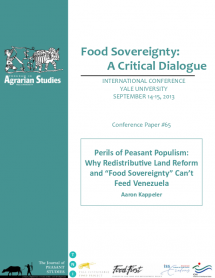Ideas into movement
Boost TNI's work
50 years. Hundreds of social struggles. Countless ideas turned into movement.
Support us as we celebrate our 50th anniversary in 2024.

Since 2001 the Bolivarian government of Venezuela has embarked on an ambitious agrarian reform project aimed at establishing food sovereignty and reducing overwhelming import dependency. This project has centered mainly on the reconstitution of the national agriculture system, which was destroyed over the course of the twentieth century by resource extraction, the petroleum economy and waves of neoliberal trade policy.

Since 2001 the Bolivarian government of Venezuela has embarked on an ambitious agrarian reform project aimed at establishing food sovereignty and reducing overwhelming import dependency. This project has centered mainly on the reconstitution of the national agriculture system, which was destroyed over the course of the twentieth century by resource extraction, the petroleum economy and waves of neoliberal trade policy. Paying for food imports with revenue derived from the petroleum industry, at one point, Venezuela imported more than eighty-five percent of its food from foreign sources. Venezuela was effectively held hostage to price fluctuations on international energy markets and left in a precarious position. Realizing the tremendous vulnerability this created, the Venezuelan government wrote the concept of food sovereignty into its constitution in 1999 and began to take drastic steps to reduce imports.
This article explores the inherent contradictions in the transition from a food system based largely on imports to a model of agriculture grounded in the principle of food sovereignty. It takes as its case study the recent efforts of the Bolivarian government of Venezuela to shift to endogenous food production and build an agriculture sector oriented toward satisfying the food requirements of its majority-urban population. This article underscores the many challenges faced by the populist government after decades of economic policies designed to integrate Venezuela into global markets and the challenges involved in enacting redistributive land reform in this peripheral capitalist context.
The failure of the Venezuelan government to recruit a labor force to reestablish peasant agriculture in the interior suggests that food sovereignty cannot be easily applied to every national context and that Venezuela lacked the basic preconditions for a model of agriculture based predominantly on peasant smallholders. This basic incompatibility accounts for the current turn toward a state-run food system incorporating aspects of the factory-in-the-field model and industrial enterprises and populist food distribution programs.
Aaron Kappeler, Researcher, currently working on an ethnographic account of the restructuring of agriculture and nation-state in the Bolivarian Revolution Aaron E. Kappeler, then a student at the Universtiy of Toronto, Toronto, Canada, was awarded a grant in April 2009 to aid research on ‘Sowing the State: Land Reform and Hegemony in Rural Venezuela,’ supervised by Dr. Tania Murray Li. This research provides an ethnographic account of the restructuring of agriculture and nation-state in the Bolivarian Revolution. This project investigates the transformation of land tenure relationships and productive activity in light of the challenges faced by reformers after decades of neoliberal policy. Based on 18 months of fieldwork in El Centro Tecnico Productivo Socialista Florentino (an agricultural enterprise located in Barinas in the central plains), the account centers on the enterprise, its operation, and the openings created for subaltern actors in its relations with producer communities and the wider context of state formation.
Food Sovereignty: a critical dialogue, 14 - 15 September, New Haven.